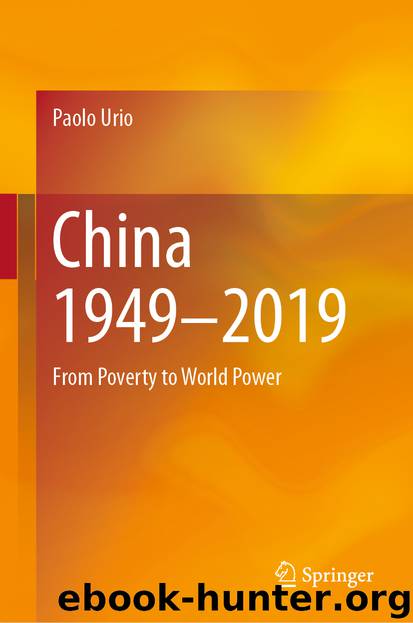China 1949–2019 by Paolo Urio

Author:Paolo Urio
Language: eng
Format: epub
ISBN: 9789811388798
Publisher: Springer Singapore
5.5 The Import of Management Tools: The Case of Public Private Partnerships
Since the beginning of reforms China has introduced some market mechanisms, thereby privatizing some sectors of its economy that developed alongside the SOEs. It is therefore not surprising that the idea of establishing some forms of cooperation between the public and the private sectors appeared already at the end of the 1980s (Yang and Zhang 2010). Nevertheless, it is only at the beginning of the Xi Jinping era that PPPs, a clear import from the West, became an important tool for the provision of public services, in spite of the serious caveats that have emerged in the literature over the last 20 years or so. It is interesting to note that this decision was taken at a time when international organisations, favouring the private sector over the public sector, such as the World Bank and the United Nations Economic Commission for Europe, developed a world-wide strategy for sustaining the adoption of PPPs in practically all domains and in all parts of the world.18 It remains that China’s decision in favour of PPPs was taken to curb the debt that provinces and municipalities had accumulated during the development phase dominated by public investments. PPPs was then seen as a means to resort to private investments for the provision of public services, thus alleviating the burden from the public local authorities.
At first sight, associating private and public actors seems to be a good idea. But the Western experience shows that PPPs are not necessarily a good option, or more exactly, they may deliver positive outcomes only under certain conditions and in certain sectors. Moreover, experience shows that it is not easy to transpose institutional arrangements such as PPPs from the Western political environment, where they took form, to a country with very different polity, economy and cultural values. It is therefore necessary to evaluate under what conditions PPPs may produce the expected positive outcomes (Urio 2010c).
Download
This site does not store any files on its server. We only index and link to content provided by other sites. Please contact the content providers to delete copyright contents if any and email us, we'll remove relevant links or contents immediately.
International Integration of the Brazilian Economy by Elias C. Grivoyannis(107537)
The Radium Girls by Kate Moore(12010)
Turbulence by E. J. Noyes(8014)
Nudge - Improving Decisions about Health, Wealth, and Happiness by Thaler Sunstein(7687)
The Black Swan by Nassim Nicholas Taleb(7097)
Rich Dad Poor Dad by Robert T. Kiyosaki(6590)
Pioneering Portfolio Management by David F. Swensen(6278)
Man-made Catastrophes and Risk Information Concealment by Dmitry Chernov & Didier Sornette(5993)
Zero to One by Peter Thiel(5778)
Secrecy World by Jake Bernstein(4735)
Millionaire: The Philanderer, Gambler, and Duelist Who Invented Modern Finance by Janet Gleeson(4456)
The Age of Surveillance Capitalism by Shoshana Zuboff(4272)
Skin in the Game by Nassim Nicholas Taleb(4231)
The Money Culture by Michael Lewis(4182)
Bullshit Jobs by David Graeber(4176)
Skin in the Game: Hidden Asymmetries in Daily Life by Nassim Nicholas Taleb(3985)
The Dhandho Investor by Mohnish Pabrai(3749)
The Wisdom of Finance by Mihir Desai(3726)
Blockchain Basics by Daniel Drescher(3571)
